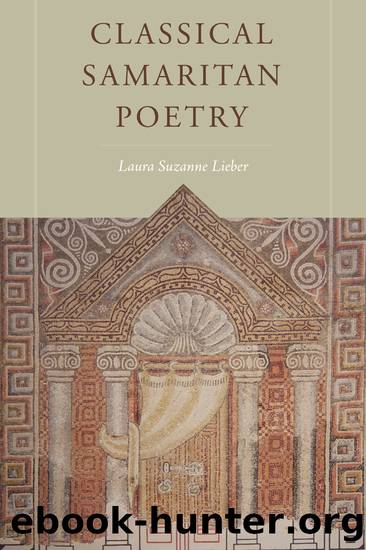Classical Samaritan Poetry by Laura Suzanne Lieber

Author:Laura Suzanne Lieber
Language: eng
Format: epub
Publisher: Penn State University Press
Marqe ben Amram
MARQE BEN AMRAM was, according to Samaritan tradition, the son of the priest Amram ben SeredâAmram Dare, the first great Samaritan poet and a participant in the Samaritan reformation under Baba Rabbahâand the father of the last major classical Samaritan poet, Ninna ben Marqe. Whereas Amram Dare and Ninna are both known exclusively as poets, Marqe wrote not only poetry but also prose, in his magisterial exegetical composition known as Tibat Marqe (also sometimes referred to as Memar Marqe).1 Indeed, later Samaritan tradition refers to Marqe as âthe source [or âCreatorâ] of wisdomâ (Aramaic, bedawah de-hakhamatah) and âthe fountain of wisdomâ (Arabic, yanbÅ« Ê¿al-hikma).2 While Marqeâs poetic works have remained a central part of Samaritan worship down to the present day, Tibat Marqe has received more attention from modern scholars. Samaritan liturgical poetry has, like Jewish hymnography of the same period, been neglected in favor of more âscholarlyâ midrashic works. As the present study illustrates, however, Marqeâs poetry should also be reckoned a crowning achievement of Samaritan exegetical as well as literary creativity.
Marqeâs name most likely derives from the Latin âMarcus.â It reflects the lingering influence of Rome in classical Samaritan culture and resonates with the names of his father, Tuta (Titus), and his son Ninna (Nonus). Later Samaritan tradition records a hagiographic legend concerning his name: an angel appeared in a dream to Amram Dare shortly before Marqeâs birth and informed him he was to name his son Moses. However, because Samaritan interpretation of Deut 34:10 prohibits giving such a name, Amram Dare named the child Marqe, which has an equivalent numerical value (345) according to gematria.3 While this account is of questionable historicity, it nonetheless reflects Marqeâs great stature among the Samaritans and underscores his particular affinity for Moses as a teacher, interlocutor with the deity, and scribe.
Marqe lived in the late third or fourth century CE; unlike his father he is not included among the ranks of Baba Rabbahâs reformers, which suggests that he was young or at least not yet prominent at the time of the reformation. Marqeâs influence on Samaritanism, however, is evidenced by his enduring literary significance. In addition to Tibat Marqe, he composed twenty-five liturgical poems, and the Samaritans consider him to be the greatest of their hymnographers. While some of his poems are performed in abbreviated form in contemporary Samaritan liturgy (Ben-Hayyim published only the abbreviated versions), the complete texts were preserved in earlier manuscript traditions (and thus are available in Cowleyâs edition).
Marqeâs poetry differs noticeably from that of his father, although there are similarities as well, particularly with Amram Dareâs longer compositions outside the Durran (Amram Dare 23â28). Like Amram Dare, Marqe writes in a distinctive Palestinian dialect of Aramaic, akin to the Jewish Palestinian Aramaic (JPA) of their Jewish neighbors, and like his father, Marqe composed without end rhyme.4 Marqe makes frequent use of alphabetical acrostics as a structural device, as Amram Dare does in his longer poems; in the works of both poets, these compositions typically have
Download
This site does not store any files on its server. We only index and link to content provided by other sites. Please contact the content providers to delete copyright contents if any and email us, we'll remove relevant links or contents immediately.
| African | Asian |
| Australian & Oceanian | Canadian |
| Caribbean & Latin American | European |
| Jewish | Middle Eastern |
| Russian | United States |
4 3 2 1: A Novel by Paul Auster(11074)
The handmaid's tale by Margaret Atwood(6874)
Giovanni's Room by James Baldwin(5896)
Big Magic: Creative Living Beyond Fear by Elizabeth Gilbert(4734)
Asking the Right Questions: A Guide to Critical Thinking by M. Neil Browne & Stuart M. Keeley(4599)
On Writing A Memoir of the Craft by Stephen King(4221)
Ego Is the Enemy by Ryan Holiday(4002)
Ken Follett - World without end by Ken Follett(3981)
The Body: A Guide for Occupants by Bill Bryson(3816)
Bluets by Maggie Nelson(3722)
Adulting by Kelly Williams Brown(3681)
Guilty Pleasures by Laurell K Hamilton(3600)
Eat That Frog! by Brian Tracy(3525)
White Noise - A Novel by Don DeLillo(3443)
The Poetry of Pablo Neruda by Pablo Neruda(3371)
Alive: The Story of the Andes Survivors by Piers Paul Read(3320)
The Bookshop by Penelope Fitzgerald(3237)
The Book of Joy by Dalai Lama(3234)
Fingerprints of the Gods by Graham Hancock(3223)
